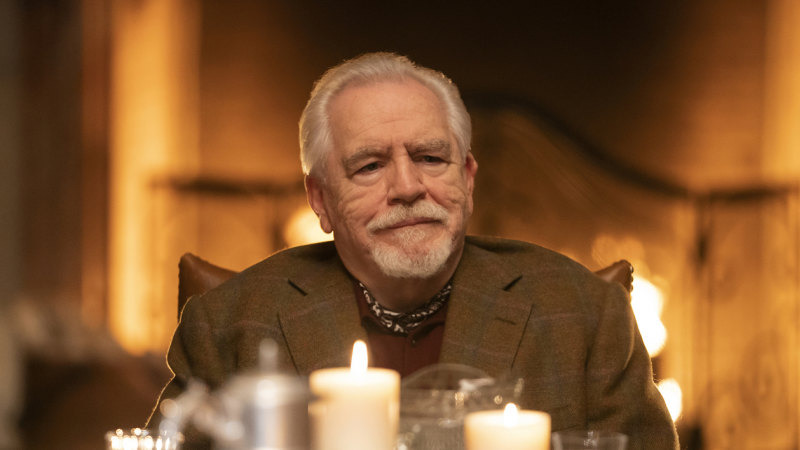Save articles for later
Add articles to your saved list and come back to them any time.
American English pervades our language 24/7. We rain-check coffee dates, or grab take-out to go. We touch base. Reach out. At sidewalk cafes, we say wait up, my bad, no biggie. From the get-go, pissed meant drunk, but thanks to Yanks the label can now mean rankled (sorry, sore) as much as sozzled. The trend is annoying, period.
If you wish to complain, join the line. When it comes to imported idiom, exasperation seems the new normalcy. Grumbles are constant, whether readers despair about diapers or drive-thru, Hoover or threepeat. Medal, the verb, only has to infiltrate a headline to trip a collective sigh.
After years of Americanisms, the language exchange has finally been reversed, partly thanks to Logan Roy.Credit: HBO/Foxtel
Still, more than a few Americanisms appeal. John Doe can keep his candy, his restrooms and fanny packs, but I don’t mind keeping June 25 versus our Anglo clunkiness of the 25th of June, while half-hour (as opposed to half an hour) saves half a second to say. You won’t catch me deplaning, or doing the math, or dunking donuts with my bae. But am I happy to succumb to ballpark figure and couch potato? You bet.
Truth being, all whines are futile. As individuals, we can resist of course, refraining from freebie and megabucks, yet one person’s defiance is never a wrench in the works. The battle is doneski. Were this power-play a boxing match, us-versus-US, the fight would long have been declared, seeing American English declared the winningest.
Lately, however, there’s been a counterpunch, a steady tide of British terms seeping into American dialogue. New Yorker Ben Yagoda, a retired professor of English, calls them NOOBs – Not Once-Off Britishisms. Back in 2011, commissioned by Slate magazine, Yagoda collated a swag. Some were subtle, like run-up or advert, presenter over anchor. While others felt faddish, like laddish or gobsmacked, telly or kerfuffle, twee or plonk.
Spice Girls endowed posh and ginger, the adjectives, to LA’s chattering classes: another UK import, the very cohort to propagate such fresh arrivals. Just as British journalists (or journos as more Yanks learnt to say) like Tina Brown and Christopher Hitchens amplified the London-ese, sneaking appetiser and bespoke over the Atlantic. Nor did the NOOBs end there. Since 2011, the more Yagoda looked, the more invasive idiom he found, full-stop.
Indeed, the vigorous riposte of British film and telly has obligated Yagoda to start a blog, where Downton Abbey and The Crown, Harry Potter and Succession have been hailed as linguistic heavyweights, converting US shades to sunnies, lines into queues and snafu into a dog’s breakfast.
Wait a minute. Was that Succession, you said? Surely that’s an American drama. The daft muggles of Hufflepuff may well be accidental influencers, doling out biscuits to Bostonians, but how did Waystar Royco manage to smuggle Anglo-language into the US? The show deals with an American dynasty, living and loathing on American soil.
The answer lies in Jesse Armstrong, born in Shropshire, parachuted into New York as showrunner, working beside Dundee’s own Brian Cox (Logan Roy), Norfolk’s Matthew Macfadyen (Tom) and Adelaide’s Sarah (Shiv) Snook. Not that actors change lines willy-nilly (to use a Britishism), yet vernacular tweaks infest each season.
Americans say brain trust, while Shiv prefers brains trust – our way. In his memoir, Putting the Rabbit In the Hat (Quercus, 2021), Cox confesses to trading the scripted word gays for a homophobic slur to add expat venom to a rant. Indeed, maybe the US-us seesaw (forget teeter-totter, mate) is slowly levelling out. Who needs Uncle Sam if Bob’s your uncle?
To read more from Spectrum, visit our page here.
The Booklist is a weekly newsletter for book lovers from books editor Jason Steger. Get it delivered every Friday.
Most Viewed in Culture
From our partners
Source: Read Full Article

